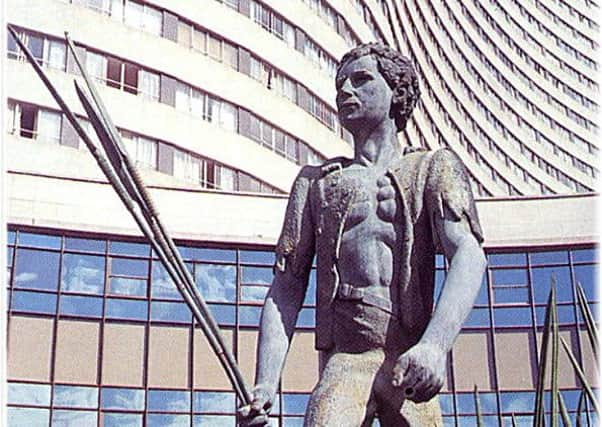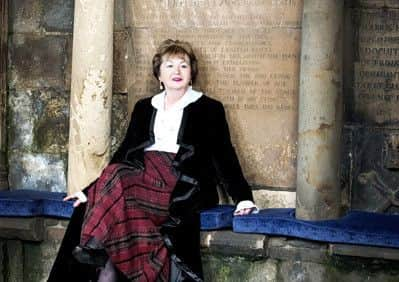The legend of John Ross - who became a hero at 12


A famous ship, along with roads and schools on the continent, have been named after John Ross.
While legions of Scottish diaspora have left their indelible mark on the world over the centuries, few can rival the exploits of Ross, whose real name is Charles Rawden Maclean – but little is known in his homeland about his extraordinary deeds in the hostile world of the Zulus.
Advertisement
Hide AdHowever, all that is about to change thanks to a trilogy of books by debut author, Isabella Bleszynski, who has just released the first of the books, A Dance Called Africa, to mark the 200th anniversary of Maclean’s birth.


Kingdom of a Thousand Days and Lord of the Red Fire will follow over the next year.
The author describes how, shipwrecked on the Wild Coast of south-east Africa when he was barely 10 years old, MacLean was the youngest member of an ivory-seeking expedition led by two former Royal Naval officers.
Consequently, he was among the first white men to come face to face with the Zulus and their indomitable warrior King, Shaka Zulu.
Shaka takes a shine to the boy with the red hair and detains him at ‘His Majesty’s Pleasure’ in kwaBulawayo, his stronghold, where within a few years he is able to earn the name of iQawu - Shaka’s hero.
Mrs Bleszynski, asks: “Who could fail to be intrigued by such a scenario?
Advertisement
Hide Ad“However, what really drew me into the story was the change that comes over the boy during the ‘thousand days’ he spends with Shaka.
“Years later, as a ship’s master based in the Caribbean, MacLean describes his ‘horror’ and ‘despair’ at being delivered into Shaka’s hands when barely 10 years old, but within the next few years could confidently assert, “...with the exception of his mother Nandi, I was the only living soul that dared breathe a contradiction to his will. That I had the influence and courage to plead the cause and defend a doomed victim from the rage of him before whom armies of warriors trembled and bowed to the dust...” seems to belong to those incidents which are classed in the catalogue of fiction.”
Advertisement
Hide AdThe author added: “What happened between the ages of 10 and 13 to bring the boy from one state of mind and circumstance to the other?
“The white boy in the court of the fearsome Shaka Zulu and the subsequent relationship that develops between them is a true and really remarkable part of the story, little-known even in South Africa itself.”
South Africa only knows him as ‘John Ross’ - the name the young Maclean acquired somewhere along the way, for reasons unknown.
His legend is built around an incident described in the old Zululand records: “John Ross, the youngest crew member, the only one with the fitness and stamina to stand a chance of success, volunteered to undertake the round trip of 600 miles through unknown territory to the Portuguese port of Delagoa Bay (Maputo) to purchase the medicines urgently needed for the survival of the ailing mariners.
“Accompanied by a group of Zulus, he did just that. No European had ever made the trip and survived to tell of it. That a mere 12 year-old boy had achieved it - was in itself, the stuff of legend.”
For generations ‘John Ross’ has been held in great affection by the people of kwaZulu Natal.
Advertisement
Hide AdA statue, an eleven-storey Art Deco building, a highway and a bridge all bear his name in Durban and there has been a TV film about his life.
However, those are just two excerpts from a life less ordinary that took Charles Rawden MacLean from Scotland, through the heart of darkest Africa, then to the Caribbean island of St Lucia and to a life where he remained loyal to the African people of his youth and continued to fight for the rights of those who had been forced into slavery.
Advertisement
Hide AdThe author said: “It is little wonder it ended up a trilogy because a single book could never do justice to a story with such an epic sweep, from the rise of Shaka and the birth of McLean in 1815 to its fall and the death of Mclean in 1879.
“Even though the books belong to the genre of historical fiction, I stayed as faithful to the real events and facts as I could, and what I found in MacLean’s own writing was my guiding light.
“I worked in Africa as a teacher for over 20 years and was also able to draw on the many extraordinary things I learned and observed during that time.”
More about The ‘John Ross’ Trilogy and A Dance Called Africa can be found at: www.stravaig-books.com.
Released as an e-book on Amazon this month, it is to be followed by the print version.